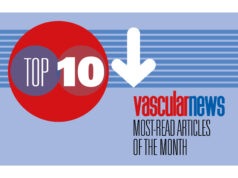 Artivion has announced data from the AMDS PERSEVERE clinical trial presented in a late-breaking science presentation at the Society of Thoracic Surgeons (STS) 2025 annual meeting (25–27 January, Los Angeles, USA). The data include clinical outcomes across the full 93 study participant investigational device exemption (IDE) cohort at one year following AMDS implantation.
Artivion has announced data from the AMDS PERSEVERE clinical trial presented in a late-breaking science presentation at the Society of Thoracic Surgeons (STS) 2025 annual meeting (25–27 January, Los Angeles, USA). The data include clinical outcomes across the full 93 study participant investigational device exemption (IDE) cohort at one year following AMDS implantation.
The PERSEVERE trial is a prospective, multicentre, non-randomised clinical trial to determine if patients with acute DeBakey Type I aortic dissection can be treated safely and effectively using the AMDS Hybrid Prosthesis. The trial is designed to support the company’s forthcoming application to the US Food and Drug Administration (FDA) for premarket approval of the AMDS.
The trial consists of 93 participants in the USA who have experienced an acute DeBakey Type I aortic dissection complicated by malperfusion.
Shinichi Fukuhara (University of Michigan, Ann Arbor, USA) presented the data from the PERSEVERE US IDE trial, demonstrating a sustained benefit of AMDS out to one year showing minimal new occurrence of stroke, renal failure requiring dialysis, or myocardial infarction. A total of 80% of patients survived through one year with mortality after 30 days attributed to comorbidities and dissection-related complications.
Core lab analysis of follow-up computed tomography (CT) scans suggests AMDS prevents the occurrence of distal anastomotic new entry (DANE) tears which compares favourably to expected rates of early reintervention and DANE tears in this patient population, Artivion states in a press release. DANE tears occur in up to 70% of patients following hemiarch repair without AMDS, allowing continued blood flow into the false lumen created by the dissection.
The presence of DANE is associated with enlargement of the aorta, reoperation, and increased mortality. In contrast, DANE has not been detected in any patients in the PERSEVERE study and it was not reported in the DARTS study through five years of follow-up of AMDS-treated patients. The need for unanticipated aortic reoperations was low at 4.3%.
Fukuhara commented: “Patient outcomes following AMDS treatment of acute DeBakey Type I aortic dissection with malperfusion remain impressive through one year after operation. AMDS is an important tool for cardiovascular surgeons in treating this devasting disease.”
“We are very pleased to see such clinically meaningful one-year data for AMDS, particularly the complete avoidance of DANE tears. These data build on the positive findings from the 30-day readout and validate with the groundbreaking, lifesaving nature of AMDS,” said Pat Mackin, chairman, president, and chief Executive officer of Artivion. “We look forward to bringing AMDS to more patients through our recently received Humanitarian Device Exemption (HDE) while continuing our work with the FDA towards premarket approval, which we still expect to receive in late 2025.”













